

How did you get into choir?
I don't remember a time that I haven't been in choir. I sang in church when I was little. And then I joined Glee Club in fifth grade, and the Glee Club director showed interest in me. I knew that I sang in church, and I guess I knew that I liked singing at home, but she was the person who said, “Let's audition for the Cincinnati Boy’s Chorus. Let's sing solos.” And she really just showed me attention and made me feel like I had a talent.
And then when I was in junior high, my choir director initiated giving me private lessons. One quarter, I was the only student in choir to get an A+, which created a lot of contention amongst my co-singers. And then in high school, I remember I was changing school districts, so I wasn't going to join choir because I didn't know if it would be a cool thing at that school or not. So I went to go sign up for classes, and luckily the guidance counselor was like, “No, our choir here's a really big deal, even more than sports.”
So I signed up for choir as a freshman, and there were only two guys enrolled, which was strange because there were lots of boys in the choir. So he let us sing with the senior choir. Then that director showed interest in me and got me a scholarship to a music camp held at a university, which is where I ended up going to college and eventually getting my master’s degree.
Where was that?
Eastern Kentucky University.
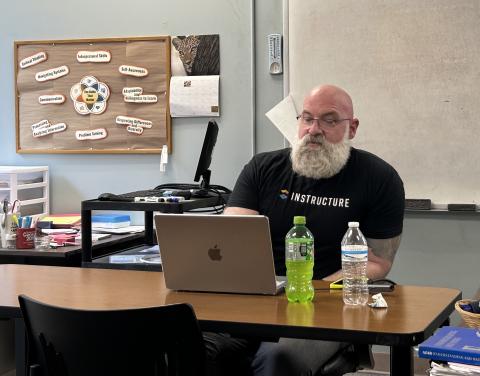
Did anyone else in your family participate in music?
No. No, it's a fluke. My dad sings well, but it was never anything that he did. He was a football player, you know, a sports guy. But I've always had parents who supported me and my interest in music. They just thought it was great, never missed a concert. Things like that.
How did you start the adult choir in Salt Lake City?
I'm a huge Real Housewives fan. I've watched every city, every episode, never missed one. So when I was on my honeymoon in Mexico in November of 2020, The Real Housewives of Salt Lake City premiered. My husband and I looked at each other and were like, we have to talk about this. This is wild. We have to talk about this.
We started a podcast called the Real HouseBears, and then a friend who works in the magazine business got us the email address of every housewife from every city. So we emailed all the Salt Lake City Housewives and invited them to be on our podcast, and one of them responded. She owns a med spa and came on the podcast, and we became friends immediately, just clicked. And then one night, we were at her house playing piano and singing and just goofing around, and—well, people in Salt Lake City are very musical. Most of them are either currently Mormon or former Mormons, and those are very musical households. And she is a former Mormon who missed having a place to get to make music and build community. And she also now had the opportunity to see and hear music that she wasn’t allowed to before. So she was like, “well, let’s start our own choir.” And that's what we did.
What’s it like directing the choir?
I mean, it was funny. For more than twenty years, my identity as a human being was as a middle school choir teacher. When you're a teacher, that's who you are. It's not what you do. So I really struggled to understand that I could still do music once I left the classroom. It wasn’t my identity anymore, so was I even a musician?
There were a few years where music and I just took a break. I wasn't listening to music. I wasn’t singing. I was podcasting and I just kind of didn't understand that that's still who I am. A musician. And so, when we started to choir together, I cried pretty much every rehearsal for the first several times because I was able to realize that there was a hole that I had ignored that was now getting filled.
Did you find it a harder to lose your identity as a teacher or as a musician?
Musician, because with this job, I'm still a teacher. I couldn't have gone to another job where I'm not in schools. The teacher identity is something that you can never escape. Never ever ever. When you're a teacher, you're a teacher at home, you're a teacher at school, you're a teacher at church, you're a teacher everywhere you go. That's something that you just can't escape. When I'm not in schools, like when we're going through a slow time where people aren't asking for in-person professional development, I'm so anxious because I feel like I'm not at home in myself.
The teacher identity is something that you can never escape. Never ever ever. When you're a teacher, you're a teacher at home, you're a teacher at school, you're a teacher at church, you're a teacher everywhere you go. That's something that you just can't escape.
Did you always know you wanted to be a teacher?
I've known it since I was 17. When I was 17, I knew where I wanted to go to college. I knew what I wanted to be. I did have an idea that I wanted to go to three different universities and eventually get my doctorate and teach college. But I ended up staying in the same university to get my master’s degree, and then I started teaching middle school.
Did you ever question if you would keep teaching throughout your career?
A little bit. I mean, there are just some years that feel hard. Being a teacher is hard every day, but sometimes you just have those years. The whole year is like, Oh, my gosh, I don't know if I can ever do this again. But whenever I thought about a different career path, it was like—well, maybe I'll dive into special ed, or maybe I'll become a guidance counselor. It was never outside of education.
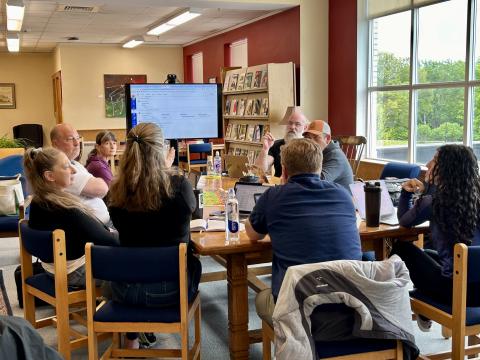
Why do you think some years are harder than others?
Sometimes bad years can come from your home life spilling into our work life. I think that for some of those years, I may have just been going through a hard time personally. But also, there are years for a choir teacher that you don't have enough students in choir, or you’ve got 83 girls and only two boys, and what do you do with those boys? And some groups of kids are just tougher.
But even though every day is different, every day is still the same. I mean, you have different kids. We're singing different songs and dealing with different issues, but we're still doing our warmups and rehearsing for the concert and prepping for the competition that we're going to do. So whether it’s a good year or a bad year, sometimes there's just that comfort and stability of having a daily grind that's so familiar.
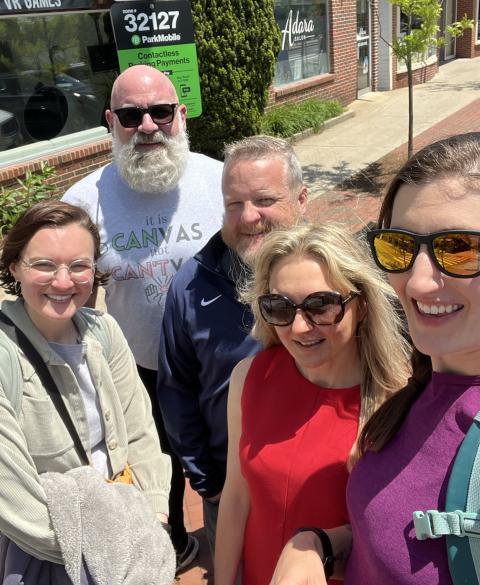
How did you end up transitioning into this job, Principal Trainer for Canvas?
I never considered that I wasn't going to be a teacher. I mean, moving to this job was kind of an accident—actually, very much an accident. It’s like when you get married, you get married for life. You don't think that you're ever not going to be married to that person.
And when you're a teacher, again, that's who you are, and there's really nowhere to go from there. You could become something else like a guidance counselor or an administrator. But when you're a teacher, there's no forward motion, at least in your career. And sometimes there’s a lot of comfort in that, knowing you can do this another year because you’ve been doing it for the past several years. But sometimes it's also stifling.
How did you accidentally start to work for Canvas?
My last year with the school, I worked as a Canvas Administrator at the school district level. Really my job was to install apps and change parent passwords. But my office wife saw the job position on the Instructure website and applied for it. And it was just a whim, but I said—do you mind if I apply? She said go ahead. We both got the interview, and I got the job.
Are you still friends with her?!
Ha, oh yes! Actually, it was perfect. It was perfect because she didn’t realize how much travel was involved in the job and had small children, and now she’s a school principal. So it was really lucky. It wasn’t the job for her, but it was perfect for me.
Have you always been interested in tech?
Oh, yea. I've always been obsessed with tech. I was A+ certified. I had a tech team at my school. I was a technology coordinator at my school. So I always felt excited about educational technology—at least until Canvas came.
I think part of my hesitation to try Canvas was that none of us knew what a learning management system was. And all the technology I had explored before was because I had wanted to learn about it. You know? I was already familiar with it before anyone else was. And so here was a time when someone was giving me this new technology that was completely foreign to me and I was like, “How am I going to be the expert on this one? I don't even know what it is.”
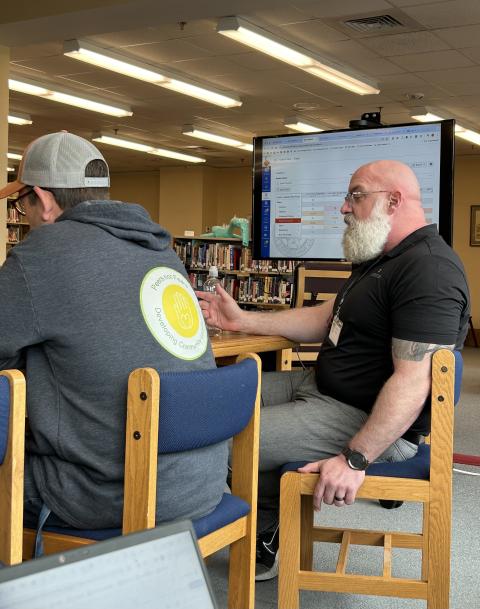
What was the Canvas rollout at your school like?
My school district didn't make the smartest decisions when they rolled out campus. Not only did they give us this new platform, but also that was the same year they decided to give every kid a Chromebook. And Chromebooks were new to us, and the operating system was new, because at that same time they switched everyone from Office to Google. So we had to learn three new things, and it was just too much. Teachers were literally crying in the hallways. And out of those three changes, you know, every kid had a Chromebook in their hands, so you needed to focus on that. And then you needed to figure out Google because otherwise you couldn’t do any word processing or worksheets or anything like that.
They did slowly roll it out, so it was okay in the end. By the time we had gotten used to the other technology, we could focus on Canvas. But it was a lot when it was first introduced. Just too much.
When was the moment that you decided to give Canvas a chance?
When they made me! It took me three years before I would even log in. I just didn't understand how Canvas was going to teach my students how to sing. And again, there were not really any other learning management systems at the time other than Blackboard, so I didn't even really know what it did or why we had it.
But just making me do it was the first step, and then what changed me from trash talking Canvas in the teacher lounge to spreading the gospel of Canvas was SpeedGrader. It changed everything for me. Actually, really it was using SpeedGrader with attached rubrics that included my standards in them. It’s the perfect combination. Tracking the learning mastery of standards is a pain unless you have Mastery Connect or Canvas or some other tool. It’s so much easier if you have something that maps your assessment over time.
What changed me from trash talking Canvas in the teacher lounge to spreading the gospel of Canvas was SpeedGrader.
My last year teaching I had over 230 students. So to be able to flip through SpeedGrader for those singing tests and other types of paper assignments gave me hours back in my life. And then, as long as my rubric was built well, I was finally able to provide meaningful feedback. You know, with 230 kids, when you're using paper you're spending an hour in the copy room, and then you're writing their name on it and then you're filling it out and then you're attaching it to an assessment—it’s so much time that you’re not spending with the student work itself. But with Canvas, you really just click and provide comments and move on with your life.
Also, as a choir teacher, a lot of school administrators don't even know that we have standards. So it was nice for me to be able to show evidence of teaching and learning of our standards. And SpeedGrader is just click click click click click and then you're done. It really did save me time.
In your role with Instructure, what’s been your favorite city or state to visit so far?
Oh, my. Well, I have to say I really enjoyed the barbecue in Kansas City. I don't know that I loved Kansas City, but I'll never forget the barbecue. Toronto was probably my favorite city to visit for work, though New York City is one of my favorite cities in the world. Some of our other trainers go to New York, but I never get sent there. Dallas is a good time, too. Texans know what they want.
Most important question. Do you have pets?
This is the only time in my life I haven't had pets. I hate it. I think about it every day. I’m a huge animal lover—I just melt and go crazy every time I see a dog, but my husband and I are traveling so much right now that it just wouldn’t be fair.
We do have a short plan to move somewhere when we’re not traveling as much, and we’re going to have a yard and get two golden retrievers named John and Roger. So John and Roger, TBD.
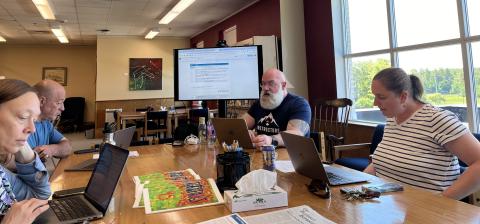
Does your school use Canvas? Check out Cory's thoughts!
So you travel across the whole country and see lots of different schools and institutions using Canvas. What are things that people are doing well?
Well, the first thing is that some people spend a lot of time on really fancy home pages, and that's not necessary. But they are pretty to look at and are more inviting for students of all ages. I don’t think people understand how effective a nice, attractive, simple homepage can be.
If your homepage welcomes your students in, and then also shows clearly how to engage in coursework, that’s really effective. In higher ed a lot of instructors use modules as their homepage, and that works great, too.
Modules really is the key to Canvas. I know a lot of schools don't dive into modules because maybe they don't quite understand what they are and what they can do, but modules is really how Canvas works. I see some creative ways that teachers organize modules and use a template to provide content inside modules, which is really nice.
Modules really is the key to Canvas.
Other things that I see schools doing well are analyzing data. Instructure has another platform called Mastery Connect that is all about learning mastery of standards, and schools and districts are finding incredible success with improving their scores. A lot of our K-12 schools use gamification, just turning a course into something that's relatable to students, a video game theme or something in pop culture. That's always really fun and engaging for students.
What is something that you think most people don’t understand about Canvas?
One thing I think people really underestimate is how comfortable our youngest learners are with technology. Kindergarteners are already taking videos and pictures with their parents' phones and tablets. There's no reason why they can't do that at school in Canvas, as long as we have the equipment. But I see kindergartners participating in discussions all around the country because they're creating audio and video discussions. Students are almost never limited to text in Canvas.
One thing I think people really underestimate is how comfortable our youngest learners are with technology. Kindergarteners are already taking videos and pictures with their parents' phones and tablets.
So Canvas has presumably changed a lot since you were first introduced to it. What are some of the changes that you have seen see?
Oh, wow. It has definitely changed! There’s a feature that can be enabled in the Help menu called “Submit a Feature Idea," and if other people in the Canvas Community vote for it and it gets traction, it goes before our product development team.

So back in 2016, Jennifer Crawford from Walhalla, South Carolina submitted the feature idea that you should be able to rearrange the course cards on your dashboard, and now you can. So the “Submit a Feature Idea” works.
But there are so many new things. I mean, New Quizzes came out in 2018, and between where it was then and where it is now is incredible. The different question types and settings has made it into a really powerful tool. So New Quizzes has changed a lot. But even the Rich Content Editor (RCE), the text box, has so much more functionality than it used to have and so many more accessibility options. Instructure has always been rated Double A in accessibility, but there are just so many more tools and settings to assist with users who use assistive technology, especially with the immersive reader now embedded in so much of the platform.
And it’s so much easier to install apps and LTIs, especially from textbook companies. Back when I was the Canvas Admin for my school district, essentially the textbook company sent you a file that you had to install, and maybe some question banks, things like that. But now essentially everybody has an app that can be installed pretty quickly and easily.
What do you hope to see Canvas do in the future?
Well, New Quizzes is getting better and better by the day. We have a new rubric tool coming out soon, and we’re all really excited to give more options for rubric building. And for me, it’s really the opportunities for providing more feedback for students. Canvas Studio gives great options for feedback on performance-based submissions. So I would like that to be an option for everyone who doesn't have Studio.
But you know, it’s already such a robust platform, and that’s why we're the number one learning management system in the country. Right now, we’re no longer just Canvas or our other tools like Mastery Connect. We’re now the Instructure Learning Platform, which includes Canvas, Mastery Connect, Studio, credentials—all of it, together. I would love to see the future of those platforms working together in harmony. They already are, but some of those integrations are newer. People are just crazy about badging right now. Micro credentialing for higher ed and professional development is taking off, and those integrations are making a big impact on education.


